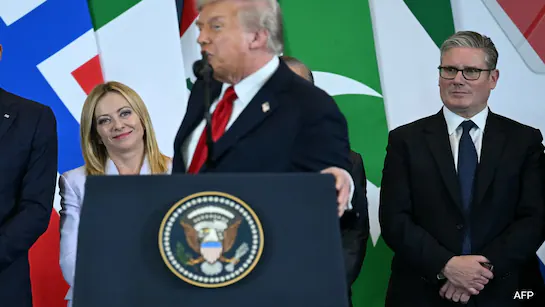In politics, respect is not just about courtesy, it is about recognising equality. When a male leader fails to offer that respect to a woman in power, his remarks are rarely “harmless banter.” More often, they reveal the deeply ingrained pattern of casual sexism that continues to thrive even in global diplomacy. That the woman politician, their counterpart is somehow not equal just because she is a woman.
The recent comments by US President Donald Trump and Turkish President Recep Tayyip Erdoğan about Italy’s Prime Minister Giorgia Meloni are prime examples of how sexism in politics often hides beneath the guise of flattery or humour.
During the Gaza Peace Summit in Egypt, a high-level discussion meant to address Middle East stability, Trump turned to Meloni and said, “You are beautiful,” before awkwardly asking if she minded being called that. The timing and tone made it worse. Imagine being at a serious peace negotiation and having a former US President interject not with policy insight, but with a remark on your appearance. Creepy? Absolutely. Unprofessional? Without a doubt.
Trump was not alone in this behaviour. In another casual conversation, Turkey President Erdoğan told Meloni that she looked great but should quit smoking – as though he were her personal physician rather than a fellow head of state. While advising someone to quit smoking may seem harmless in isolation, it carries a patronising undertone when directed publicly at a woman leader. It implies that she needs guidance, that her choices are open to unsolicited male correction.
Let’s be clear – no one disputes that smoking is harmful. But what gives these men the authority to lecture or comment on Meloni’s personal habits or appearance? Italy’s Prime Minister does not need unsolicited advice from her international peers on how to look or behave. She is a leader of a G7 nation — a political equal, not a pupil.
Sexism isn’t cool
This is precisely what defines casual sexism: the everyday language and behaviour that subtly reinforces gender hierarchies. It tells women – even those in the highest offices of power – that they are still being evaluated by their femininity, not just their intellect or leadership.
One can’t help but wonder — would Trump or Erdoğan have dared to make such remarks to someone like Margaret Thatcher or Angela Merkel? Perhaps not. But that only proves the point: even today, strong female leaders make some men profoundly uncomfortable. The actual small men who occupy big offices.
By referring to Meloni’s looks and habits instead of her policies, these leaders reduced her role from a policymaker to an object of commentary. It was a reminder that women in politics are often forced to fight on two fronts – one for their policies, and another for their dignity.
Yet, Giorgia Meloni’s response – or rather, her restraint – spoke volumes. She did not snap back or dignify the remarks with outrage. Her composure demonstrated that leadership does not require trading insult for insult. It requires focus, self-assurance, and the wisdom to know when silence says more than words ever could.
In a world where female leaders are still subjected to outdated notions of how they should look, act, or speak, Meloni’s calm strength was a quiet rebuke. Men like Trump and Erdoğan must realise — women don’t need validation, advice, or commentary. They need respect. And to be treated as an equal.









